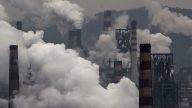【新唐人2013年08月21日讯】最近,在中国上海举行的《2013长江上游联合科考报告》发布会上,科研人员发出了最严重的警告。报告显示,长江流域密集的水电开发等工程,对生态环境和生物物种造成了灭绝性的影响,已经导致长江生态系统崩溃。对此,专家表示,当局大兴水电造成的严重环境污染,同样危及到了人类生存。分析指出,中共为片面追求经济效益,破坏生态环境的做法,势必要付出惨重代价。
大陆媒体《新闻晚报》8月15号报导,在《2013长江上游联合科考报告》发布会上,中共农业部“长江流域渔业资源管理委员会办公室”官员赵依民表示,长江生态系统不堪密集的水电开发、采矿、开挖航道等活动,目前已经处于崩溃状态。
对此,北京环保自愿者、民间水专家张俊峰表示,像长江、黄河这样的大型河流,在整个生态系统中起着至关重要的作用。一方面,它们在全球气候变化系统中起到能量输送和能量平衡的作用﹔另一方面,在河水流动过程中,对流域之内的生态系统也起着支撑作用。
民间水专家张俊峰:“如果对河流一旦采取了截流或者兴水电等等措施的话,就相当于把河流本身所携带能量,提取出来用于人类生产生活,势必就会使能量平衡的关系被打破,进而会引发整体气候系统、生态系统等等这样一种破坏,这种破坏应该随着我们对河流利用的程度多少而展现出它的影响力。”
赵依民还强调,长江上游的金沙江干流鱼类资源也已濒临崩溃,原有的143种鱼类,如今只剩下了17种。此外,据中科院水生物所等科研机构检测,长江中的鳙、鲢、青、草“四大家鱼”也急剧减少,由上世纪50年代的300多亿尾,降到了目前的不到1亿尾。
张俊峰:“由于建水库、建大坝的过程之中,使得水体原来的基本状况发生了极大的变化,水里携带的不同种类的有机物或者无机物,甚至泥沙,由于大坝的阻拦作用,就改变了水体中所含物质的种类和量,整个的生态环境发生极大变化,那么原来在水体中生存的这种水生物势必都会跟着发生变化。”
大力兴修水利电力设施,不仅给水生生物带来了灭绝性的直接影响,也对水环境造成了严重污染。长江沿岸的居民一直深受其害,对此怨声载道。
江苏宜兴市的环保活动人士吴立红:“太湖现在,像稀饭一样、浆糊一样,已经臭掉了,像大便一样臭的不得了。”
家住在长江下游太湖附近的环保活动人士吴立红告诉《新唐人》,无论污染有多么严重,当局都是采取一种漠视的态度,“中国(共)环境保护部”从来没有起到过应有的作用。
吴立红:“反映了20来年没用,为什么?现在中国应该说《环保法》很厉害的,轻者要判坐牢,重者要枪毙的,但是下面这些官员还是把上面的法律架空的,存在一个官商勾结的腐败现象,欺上瞒下,上面一些部门也在默认他们,中国的环保部有推卸不了的责任。”
另外一方面,专家认为,大规模的水库和水电站建设也是造成目前大陆自然灾害不断的原因之一。
吴立红:“从整体系统来说,会加剧气候系统的变化,也就是我们所看到的,极端的气候现象层出不穷,势必对整个流域内的生产、生活会造成我们所看到这种洪涝、干旱这样一种状态,会越来越多的出现。”
四川省地矿局地质调查队总工程师范晓早在2009年就已经警告当局,不要为了片面追求水能发电的经济效益,以牺牲百姓利益、生态环境、地质环境、自然文化遗产为代价,采用竭泽而渔、斩尽杀绝非持续发展的模式搞水电开发。他指出,这样会给生态环境和社会环境带来巨大损害和长期隐患。
从越来越多的现象显示,当局依然一意孤行,造成了如今不可挽回的损失。
采访/陈汉 编辑/张天宇 后制/李勇
Environmental Survey: Yangtze River Ecosystem Collapsing
A press release of a 2013 survey on upstream ecosystems
in the Yangtze River was recently held in Shanghai.
The researchers sent a most serious warning.
The report shows intensive hydropower
projects in the Yangtze River delta have
made local biological species go extinct.
This has led to the collapse of the
Yangtze River’s ecological environment.
Experts say that vigorous promotion of hydroelectric
construction by the Chinese Communist Party (CCP),
has caused serious pollution, endangered people.
Analysts warn that the CCP has sacrificed the environment
for excessive economic pursuits, and will pay a heavy price.
A launch event of the 2013 joint scientific research report
on the upstream Yangtze River was held on August 15.
Zhao Yimin, an official from the Agriculture Ministry,
said the Yangtze River’s ecosystem is now in collapse.
This is the result of local intensive construction, including
hydropower projects, mining, and waterway excavations.
Hydrological expert Zhang Junfeng, comments.
Large rivers such as Yangtze River and the Yellow
River play crucial roles within the entire ecosystem.
They can transfer and balance energy
coming in and out for the global climate.
Also, river flow supports the ecosystems
within the scope of the river basins.
Zhang Junfeng: “Damming up a river, building
hydroelectric stations, or similar initiatives
can upset the balance of the rivers energy.
This will trigger further destruction of the
overall climate and ecological system.
Its destructive influence depends
on human exploitation of the rivers.”
Zhao Yimin adds that fish species in the Jinsha River,
a tributary of the Yangtze River, are now near extinction.
The river now only has 17 fish species,
compared with the original 143 species.
The official research institutions reports show a sharp
drop of four major fish species in the Yangtze River.
The amount of fish is down to less than
100 Million, from over 30 Billion in the 1950s.
Zhang Junfeng: “Construction of reservoirs and dams
have greatly changed the original water situation.
Damming up the water has changed the type
and quantity of organic or inorganic matter
carried in the water, which includes sands.
This has led to a huge ecological change, directly
affecting species that originally lived in these waters.
The CCP authorities’ vigorous push in hydroelectric
construction has fatally affected local aquatic organisms.
It has also given rise to serious pollution of local waters.
Residents living along the Yangtze River have been
affected, and have been complaining for many years.
Wu Lihong, environmental activist, Yixing, Jiangsu Province:
“Lake Tai now looks like porridge.
It emits a terrible odor, like feces.”
Ms. Wu lives near the Lake Tai,
downstream of the Yangtze River.
She tells NTD that the CCP authorities have always
disregarded the pollution, no matter how serious it is.
The CCP-led Ministry of Environmental Protection
has never performed its duties, she says.
Wu Lihong: “It’s useless, even after our 20 year
efforts, to let them know about the problem. Why?
China’s current Environmental Protection Law has
severe penalties, from jail terms to the death penalty.
But local officials have made the law a mere figurehead.
It is common for officials to collude with businessmen,
with some superior authorities standing by without acting.
The Environmental Protection Ministry
cannot escape these responsibilities.”
Experts believe that large reservoirs and
hydropower construction have contributed
to currently frequent disasters in China.
Wu Lihong: “These constructions
have deteriorated the overall climate.
This is what we’ve seen, incessant
occurrence of extreme weather events.
Also, floods and droughts become inevitable
results, and we can expect more in the future.”
In 2009, Fan Xiao, the Chief Engineer at the Geology and
Mineral Administration in Sichuan Province, sent a warning.
He warned the CCP to not pursue the economic
benefits of hydroelectric power at the expense of
the ecological environment, and cultural heritage.
He said that hydroelectric power development
is like draining the pond to catch all the fish.
It is non-sustainable.
It will cause tremendous damage and hidden
dangers to China’s ecological and social environment.
Currently, more facts indicate that the CCP
authorities still continue on track with their plans.
This road has created irreparable damage for China.




























